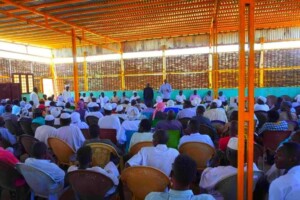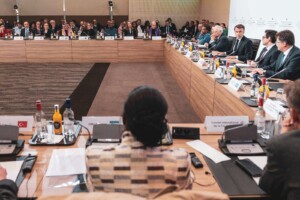Covid-19 measures eased in Sudan
The Sudanese High Committee for Health Emergencies announced yesterday that the coronavirus (Covid-19) lockdown will be eased tomorrow. The lockdown was imposed on March 21.
 Sanitising hands on the streets (Social media)
Sanitising hands on the streets (Social media)
The Sudanese High Committee for Health Emergencies announced on Tuesday that the coronavirus (Covid-19) lockdown, imposed on April 18, will be eased tomorrow.
The curfew in Khartoum state will be limited to 18:00-05:00. Khartoum International Airport will partially reopen.
A statement of the High Committee, read by Minister of Information Feisal Mohamed Saleh, called on ministries, factories and companies to limit the number of people that work to less than 50 per cent in this first phase.
Work is to be resumed gradually, while constantly adhering to the Covid-19 precautions and regulations that prevent the spread of the epidemic. The delayed Basic School exams will start on July 12. The secondary school exams for the Sudan Certificate have not been scheduled yet.
The Minister of Information warned that the lifting of the ban does not mean that the coronavirus pandemic has ended.
The Sudanese Ministry of Health reported 103 new cases of coronavirus as of July 4. Six more people died. The total number of infected people is now 9,997, of which 622 died.
The Council of Ministers decided that the working hours in the the federal ministries and the ministries of Khartoum state will be from 08:00 until 15:00. The ministers and department heads must ensure that the work can be done by 30-50 per cent of the employees. All people working must wear face masks, and work places will be sanitised regularly.
Egypt
Some 2,000 Sudanese nationals returned from Egypt on Monday. They were stranded there because of Covid-19 travel restrictions. Minister of Infrastructure and Transport Hashim Tahir allowed them to enter Sudan at the Argeen border crossing in Red Sea state. They were then transferred to Khartoum where they are now being quarantined.
The authorities also allowed some 160 Egyptians to depart to their country through the Ashkeet border crossing in Wadi Halfa.
The borders between Egypt and Sudan were closed by the Sudanese government on March 12.
Radio Dabanga’s editorial independence means that we can continue to provide factual updates about political developments to Sudanese and international actors, educate people about how to avoid outbreaks of infectious diseases, and provide a window to the world for those in all corners of Sudan. Support Radio Dabanga for as little as €2.50, the equivalent of a cup of coffee.










 and then
and then